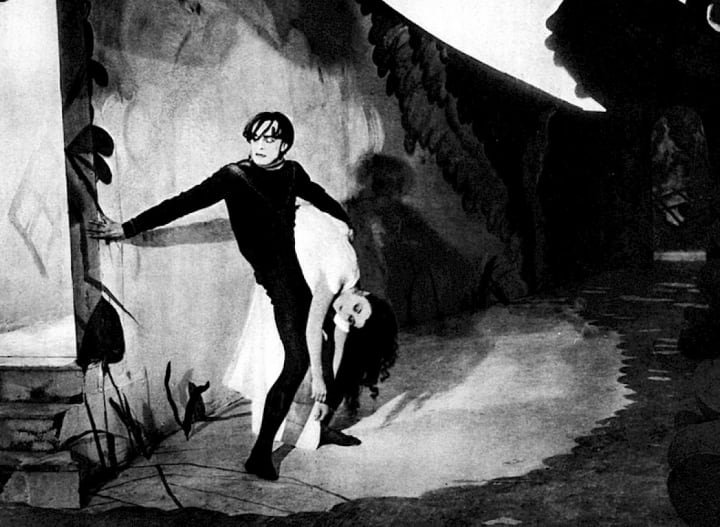The Cabinet of Dr. Caligari (1920)
1001 Movies to See Before You Die (Schneider, J.S, Smith, I.H)

In this article, we will be looking at 2019’s book “1001 Movies to See Before You Die” and going through each film in a random order that I have chosen. We will be looking at what constitutes this film to be on the list and whether I think this film deserves to be here at all. I want to make perfectly clear that I won’t be revealing details from this book such as analyses by film reporters who have written about the film in question, so if you want the book itself you’ll have to buy it. But I will be covering the book’s suggestions on which films should be your top priority. I wouldn’t doubt for a second that everyone reading this article has probably watched many of these movies anyway. But we are just here to have a bit of fun. We’re going to not just look at whether it should be on this list but we’re also going to look at why the film has such a legacy at all. Remember, this is the 2019 version of the book and so, films like “Joker” will not be featured in this book and any film that came out in 2020 (and if we get there, in 2021). So strap in and if you have your own suggestions then don’t hesitate to email me using the address in my bio. Let’s get on with it then.
The Cabinet of Dr. Caligari (1920) dir. by Robert Weine

Everyone knows the story behind "The Cabinet of Dr. Caligari" (1920) when the famed mysterious 'scientist' creates and harness the power of the somnambulist to commit horrid crimes. It became since, a real talking point in psychology with Cesare possibly representing German Society and Dr. Caligari as the over-ruling tyrannical power to which Germany was blindly following into the abyss. Considered to be the first horror film and one of the earliest examples of Film Noir, Roger Ebert called it the first real horror film.
Everyone knows the story behind "The Cabinet of Dr. Caligari" (1920) when the famed mysterious 'scientist' creates and harness the power of the somnambulist to commit horrid crimes. It became since, a real talking point in psychology with Cesare possibly representing German Society and Dr. Caligari as the over-ruling tyrannical power to which Germany was blindly following into the abyss. Considered to be the first horror film and one of the earliest examples of Film Noir, Roger Ebert called it the first real horror film.

Films that were influenced by “The Cabinet of Dr. Caligari” (1920) include other German Expressionist films such as “Metropolis” (1927), the films of the 1930s noir scene such as the famed “M” by Fritz Lang, the later films of horror and noir such as “The Third Man” (1949) and the films of Ingmar Bergman such as “The Seventh Seal” (1957). “The Cabinet of Dr. Caligari” (1920) is often considered to be the not only the first horror film but one of the best films of the German Expressionist era. If you don’t know what German Expressionism is then go ahead and read my article on it by clicking here.
“The Cabinet of Dr. Caligari” (1920) has since become one of the most discussed and debated films of its era. Its era being the Weimar Era, it became a strange mixture between horror, expressionism and a metaphor for its own day. Whilst the film critic, Lewis Jacobs, called it the most discussed film of all time.
Rotten Tomatoes gave it a 98% approval rating with the critics’ consensus stating it is: "Arguably the first true horror film, The Cabinet of Dr. Caligari set a brilliantly high bar for the genre – and remains terrifying nearly a century after it first stalked the screen.”

I concur. Ever since I watched the film for the first time (quite a bit of time ago now), I have been absolutely terrified of various things in the film ever since. At first it was just the very sight of Cesare, especially the scene when he woke up for the first time. The eyes are so expressive and terrifying, it’s like he stares into your soul.
When I grew up, I’m not going to lie, this scene still terrified me. But I also noticed the several layers of meaning with my new found knowledge as I became more and more educated in film and literature. I noticed the double life, the strangeness of Francis and the way in which Alan and Jane were both treated by Cesare and what this says about Caligari.
All in all, I have seen this film far more than ten or twenty times and I cannot help to think that every single time I’ve watched it, I’ve missed something - and it doesn’t matter how small. I think it was every single time I see Cesare in one of the last scenes of the film I tend to think about the reliability of Francis’s story and what really happened, if anything - at all.
About the Creator
Annie Kapur
200K+ Reads on Vocal.
English Lecturer
🎓Literature & Writing (B.A)
🎓Film & Writing (M.A)
🎓Secondary English Education (PgDipEd) (QTS)
📍Birmingham, UK






Comments
There are no comments for this story
Be the first to respond and start the conversation.